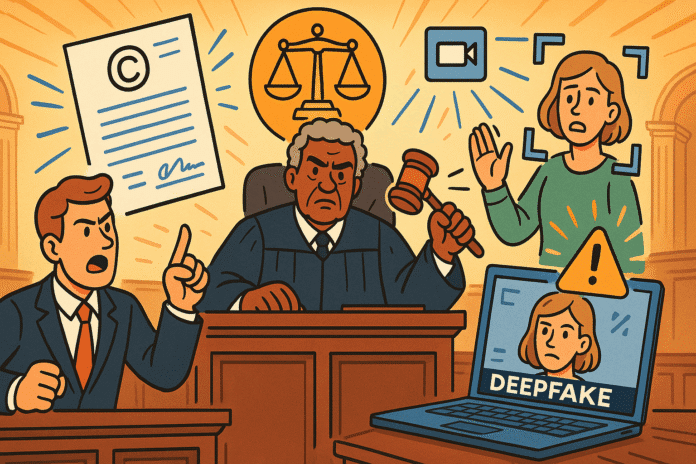New Copyright Law to Control Deepfake Misuse
Denmark deepfake law is rewriting the rules of digital identity protection. The Danish government has set the stage for a groundbreaking reform—granting every citizen copyright over their own body, facial features, and voice. With this innovative legislation, citizens will have the power to demand the removal of unauthorized deepfake content. This article explains the law’s core principles, examines political support, reveals expert and public reactions, and explores its international significance.
Understanding the Proposed Law
Denmark’s proposed amendment represents a transformative shift in how personal identity is safeguarded online. Historically, copyright law protected creative works; however, the digital era has blurred the lines between artistic expression and misuse of personal traits. The new law extends copyright protection to include individuals’ physical appearance and vocal attributes, thereby addressing the misuse of generative AI in the creation of deepfake content.
What the Law Covers
The amendment explicitly grants individuals a right over:
- Body Rights: Secure ownership over physical form, posture, and distinctive movement.
- Facial Features: A broad definition covering unique facial structures, expressions, and even subtle traits such as skin texture.
- Vocal Attributes: Protection for elements like pitch, tone, and timbre, ensuring that a person’s voice cannot be exploited without consent.
This comprehensive approach aims to empower individuals and help maintain personal dignity in digital spaces. For instance, should a deepfake video use someone’s facial imagery without permission, the affected individual can request immediate removal from digital platforms and potentially pursue compensation.
How the Law Works
Enforcement is a critical component of the law. Social media platforms and hosting services will be legally bound to remove unauthorized content upon verified requests. Failure to comply could lead to steep fines and additional penalties. Notably, the law exempts cases of parody and satire, thus preserving the right to free artistic expression while combating malicious deepfakes.
Political and Public Response
The proposed law has sparked vigorous debate, drawing both widespread support and cautious critique.
Political Support and Opposition
Denmark’s diverse political spectrum has largely embraced the law. Culture Minister Jakob Engel-Schmidt, one of the strongest proponents, emphasized,
“We are champions of freedom of speech, but human beings have the right to say yes and no to being used by generative AI.”
This bipartisan backing signals a unified parliamentary sentiment toward protecting digital identities. Despite the broad support, some political groups have expressed concerns regarding potential unintended consequences—for instance, the delicate balance between protecting individuals’ rights and not hindering creative freedom. Critics argue that restrictive enforcement might encroach upon legitimate forms of satire and artistic interpretation.
Public and Expert Reactions
Public sentiment in Denmark appears largely positive. Many citizens view the law as a timely defense against the growing threats posed by deepfakes, which have increasingly been used to manipulate public opinion and cause personal harm.
Experts in technology and digital rights have welcomed the initiative, citing statistics that show a significant increase in deepfake incidents over the past few years. Athina Karatzogianni, a respected professor of technology and society, states,
“Deepfakes can erode public trust and undermine democratic values, making it a priority for governments to protect personal identity in the digital realm.”
This stance reflects a broader acknowledgment among technology scholars and legal experts that proactive measures are imperative to mitigate the risks associated with rapidly advancing AI technologies.
Impact on the AI Industry and Digital Rights
The proposed law is set to have far-reaching implications for tech companies, particularly those involved in AI and digital media. By legally mandating that companies respect individual copyright over personal features, Denmark is forcing a re-evaluation of content management practices on digital platforms.
Effect on AI Companies
Tech giants and startups alike will face stricter regulations regarding the development and dissemination of AI-generated content. The legislative requirements will necessitate robust mechanisms to authenticate and verify consent before personal features are processed. Engel-Schmidt remarks,
“We believe it’s in the interest of tech companies to make AI work for humanity, not against it.”
This new compliance framework is expected to drive innovations in digital verification technologies, ensuring that AI models incorporate ethical safeguards from the outset.
Protecting Digital Rights
Beyond the tech industry, the new law marks a significant victory for individual digital rights. In an era where personal identities can be digitally replicated and manipulated, the right to control one’s own likeness is more crucial than ever. The amendment provides a legal foundation that reasserts individual control in the digital realm—empowering citizens to confront deepfake abuse and erroneous representations with legal recourse.
Moreover, Denmark’s initiative aligns with broader European Union regulations, including the GDPR, which already set high standards for data protection. By integrating these principles with modern copyright norms, the law fortifies the legal infrastructure necessary to safeguard citizens in increasingly digitized societies.
International Perspective and Key Data Points
Denmark’s approach is pioneering on the global stage, distinguishing itself from other national policies that may target deepfakes only in narrow contexts. Across Europe and in parts of the United States, legislation addressing deepfakes has typically focused on specific issues—such as election interference or non-consensual explicit content. In contrast, Denmark’s comprehensive bill incorporates all personal attributes across various digital contexts.
Statistics and International Comparisons
Recent studies indicate that deepfake incidents have surged by more than 200% in several European countries over the past five years. A survey conducted by a European digital rights group noted that approximately 65% of respondents felt vulnerable to unauthorized digital use of personal features. In Denmark, public concern has mirrored these statistics, driving the government to take decisive action.
Such data strongly supports the necessity of regulatory measures that ensure the digital autonomy of individuals worldwide. The Danish model not only protects its citizens but also sets a precedent for potential EU-wide or even global reform.
Addressing Counterarguments
Some critics worry that the law might impose excessive operational burdens on tech companies, potentially dampening innovation. However, the legal framework includes precise exemptions for parody and satire, which have been carefully constructed to safeguard creative expression. Moreover, the government’s proactive engagement with leading tech companies aims to foster a collaborative rather than adversarial regulatory environment. This balanced approach is critical to maintaining both robust digital rights and continued technological progress.
Challenges and Future Directions
While the law is celebrated as a pioneering step, its implementation is not without challenges. The rapid evolution of AI technology means that legal frameworks must frequently update to match emerging threats. Key challenges include:
Enforcement and Compliance
Enforcing takedown requests efficiently in a digital ecosystem characterized by rapid information circulation is an ongoing concern. Digital platforms will need to invest in new detection technologies to comply with the law effectively. The ambiguity over the boundaries of parody and genuine misuse also calls for continued dialogue among legislators, technologists, and civil society.
Global Adoption and Future Policy
As Denmark paves the way, its legislative success may inspire similar measures in other jurisdictions. The Danish government is advocating for a model that can be scaled at the European level, emphasizing collective protection against deepfake abuse. Continued monitoring and refinement of the law will be essential to ensure that it adapts in tandem with technological advances.
Citizens and policy advocates should remain engaged as these developments evolve, offering feedback to help shape a balanced regulatory framework that champions both innovation and individual rights.
A Promising Step Into the Future
Denmark’s pioneering law, which grants citizens personal copyright over their body, facial features, and voice, establishes a new benchmark in the fight against deepfake misuse. By addressing the challenges of digital identity theft and AI-driven misinformation, the country is taking a stand for transparency, human dignity, and digital rights.
As political and public support continues to build, the success of this initiative could well influence similar reforms globally. Citizens are encouraged to remain informed and to engage with policymakers to ensure that evolving technologies serve society’s best interests. Join the conversation, share your views, and advocate for digital rights that protect us all.




